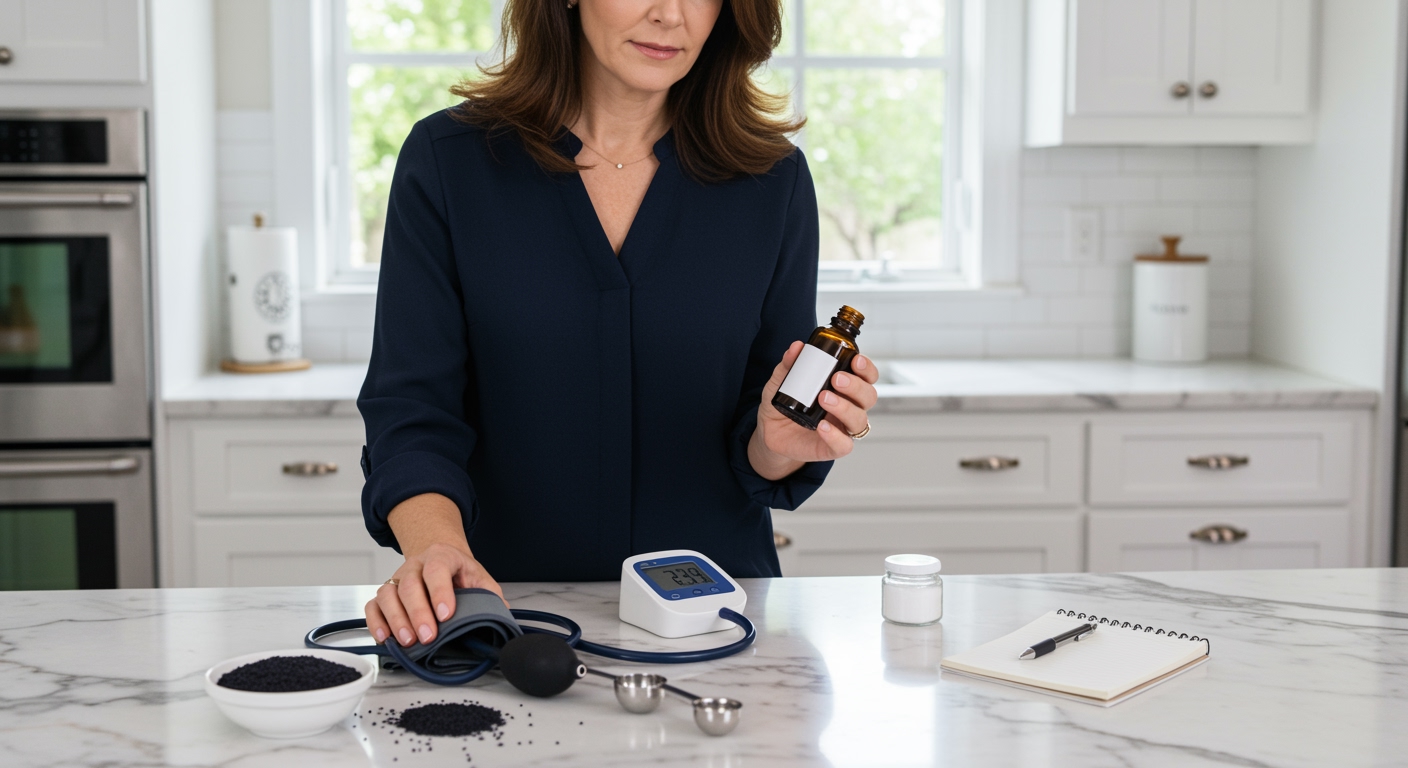✪ Key Takeaway: Black seed oil may help lower blood pressure in healthy people, but evidence remains limited and inconsistent.
Introduction
Your blood pressure monitor shows numbers that make you worry, and someone just told you about black seed oil as a natural solution.
You might be asking this question because prescription medications come with side effects, or maybe you want to try natural approaches before considering stronger interventions.
Hi, I am Abdur, your nutrition coach, and today I am going to explain whether black seed oil can actually help manage your blood pressure based on current scientific evidence.
What Does The Research Say About Black Seed Oil?
Recent studies show that black seed oil may have modest effects on blood pressure, but the results are not as dramatic as many people hope.
A 2020 study published in nutritional research journals found that participants taking standardized black seed oil for six weeks experienced small reductions in both systolic and diastolic blood pressure.
The study involved healthy adults who took 500 milligrams of black seed oil twice daily.
Their systolic pressure dropped by an average of 3-5 mmHg, while diastolic pressure decreased by 2-3 mmHg.
These changes are statistically significant but relatively small compared to what prescription medications can achieve.
However, other studies have shown inconsistent results, with some finding no significant blood pressure changes at all.
✪ Fact: Black seed oil contains thymoquinone, which may help relax blood vessel walls.
How Does Black Seed Oil Work In Your Body?
Black seed oil contains several active compounds that might influence cardiovascular health, with thymoquinone being the most studied.
Thymoquinone appears to work by promoting the production of nitric oxide in your blood vessels.
Nitric oxide is a molecule that signals your blood vessel walls to relax and widen, which can help reduce the pressure inside your arteries.
The oil also contains compounds that may have anti-inflammatory effects throughout your cardiovascular system.
Chronic inflammation can contribute to blood vessel stiffness and higher blood pressure over time.
Some research suggests that black seed oil might also influence your renin-angiotensin system, which is a hormone pathway that regulates blood pressure.
However, the exact mechanisms are still being studied, and we need more research to understand how these effects work in different people.
✪ Pro Tip: Look for cold-pressed, standardized black seed oil for better consistency in active compounds.
What Are The Limitations Of Current Studies?
Most studies on black seed oil and blood pressure have been small-scale and short-term, which limits how much we can trust the results.
The majority of research has involved fewer than 100 participants and lasted only 6-12 weeks.
We do not know what happens with long-term use or whether the effects continue over months and years.
Many studies have also focused on healthy adults rather than people with diagnosed high blood pressure.
This means we cannot be sure how effective black seed oil would be for people who actually need blood pressure treatment.
The dosages used in studies have varied widely, from 200 milligrams to 2000 milligrams per day.
Without standardized dosing protocols, it becomes difficult to recommend specific amounts or predict consistent results.
✪ Note: Never replace prescribed blood pressure medications with supplements without medical supervision.
Should You Try Black Seed Oil For Blood Pressure?
If you have normal blood pressure and want to support your cardiovascular health, black seed oil might offer some modest benefits.
However, if you have been diagnosed with high blood pressure, black seed oil should not be your primary treatment strategy.
The blood pressure reductions seen in studies are much smaller than what you can achieve through proven lifestyle changes like regular exercise, weight loss, and dietary improvements.
For example, losing just 10 pounds can reduce your systolic blood pressure by 5-20 mmHg, which is far more significant than the 3-5 mmHg reduction seen with black seed oil.
If you decide to try black seed oil, start with a standardized product and use it alongside, not instead of, established blood pressure management strategies.
Always discuss supplement use with your healthcare provider, especially if you take blood pressure medications.
Some supplements can interact with medications or cause your blood pressure to drop too low when combined with prescription drugs.
✪ Pro Tip: Monitor your blood pressure regularly if you add any new supplement to your routine.
The Bottom Line
Black seed oil shows promise for supporting healthy blood pressure, but the effects are modest and the research is still developing.
Supplements work best when they support good habits, not replace them, and this principle applies perfectly to black seed oil and blood pressure management.
I would love to hear about your experiences with natural approaches to blood pressure management, so please share your thoughts and questions in the comments below.
References
At NutritionCrown, we use quality and credible sources to ensure our content is accurate and trustworthy. Below are the sources referenced in creating this article:
- Nutritional Outlook: Black Seed Oil May Support Healthy Blood Pressure
- SciVision Publishers: Effects of Standardized Black Seed Oil
- WebMD: Black Seed Health Benefits
- PMC: Black Seed Oil Research





